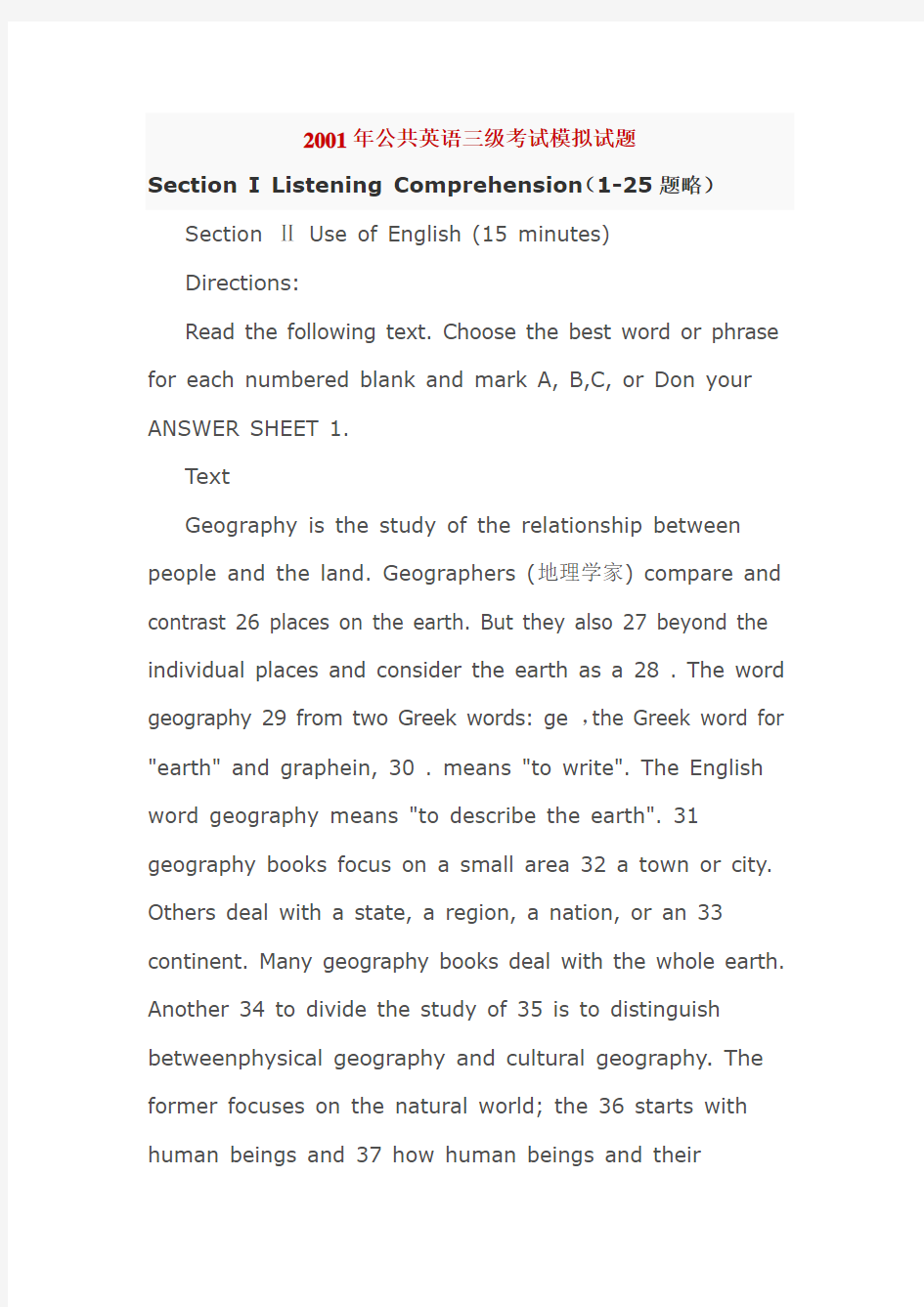2001年公共英语三级考试模拟试题

- 1、下载文档前请自行甄别文档内容的完整性,平台不提供额外的编辑、内容补充、找答案等附加服务。
- 2、"仅部分预览"的文档,不可在线预览部分如存在完整性等问题,可反馈申请退款(可完整预览的文档不适用该条件!)。
- 3、如文档侵犯您的权益,请联系客服反馈,我们会尽快为您处理(人工客服工作时间:9:00-18:30)。
2001年公共英语三级考试模拟试题
Section I Listening Comprehension(1-25题略)Section ⅡUse of English (15 minutes)
Directions:
Read the following text. Choose the best word or phrase for each numbered blank and mark A, B,C, or Don your ANSWER SHEET 1.
Text
Geography is the study of the relationship between people and the land. Geographers (地理学家) compare and contrast 26 places on the earth. But they also 27 beyond the individual places and consider the earth as a 28 . The word geography 29 from two Greek words: ge,the Greek word for "earth" and graphein, 30 . means "to write". The English word geography means "to describe the earth". 31 geography books focus on a small area 32 a town or city. Others deal with a state, a region, a nation, or an 33 continent. Many geography books deal with the whole earth. Another 34 to divide the study of 35 is to distinguish betweenphysical geography and cultural geography. The former focuses on the natural world; the 36 starts with human beings and 37 how human beings and their
environment act 38 each other. But when geography is considered as a single subject, 39 branch can neglect the other.
A geographer might be described 40 one who observes, records, and explains the 41 between places. If all places 42 alike, there would be little need for geographers.
We know, however, 43 no two places are exactly the same. Geography, 44 , is a
point of view, a special way of 45 at places.
26. [A] similar [B] various [C] distant [D] famous
27. [A] pass [B] go [C] reach [D] set
28. [A] whole [B] unit [C] part [D] total
29. [A] falls [B] removes [C] results [D] comes
30. [A] what [B] that [C] which [D] it
31. [A] Some [B]Many [C]Most [D]Few
32. [A] outside [B] except [C]as [D]like
33. [A] extensive [B] entire [C] overall [D] enormous
34. [A] way [B] means [C] habit [D] technique
35. [A] world [B] earth [C] geography [D] globe
36. [A] second [ B] later [C] next [D] latter
37. [A] learns [ B ] studies [ C ] realizes [ D ] understands
38. [A] upon [B] for [C]as [D] to
39. [A] neither [B] either [C] one [D] each
40. [A] for . [B]to [C]as [D]by
41. [A] exceptions [B] sameness [C] differences [D] divisions
42. [A] being [B] are [C] be [D] were
43. [A] although [B] whether [C] since [D] that
44. [A] still [B] then [C] nevertheless [D] moreover
45. [A] working [ B ] looking [ C ] arriving [ D ] getting
Section ⅢReading Comprehension (40 minutes)
Part A
Directions:
Read the following three texts. Answer the questions on each text by choosing A, B, C or D. Mark four answers on the ANSWER SHEET by drawing a thick line across the corresponding letter in the brackets.
Text I
No one knows exactly how many disabled (残废的) people there are in the world, but estimates suggest the figure is over 450 million. The number of disabled people in India alone is probably more than double the total population of Canada.
